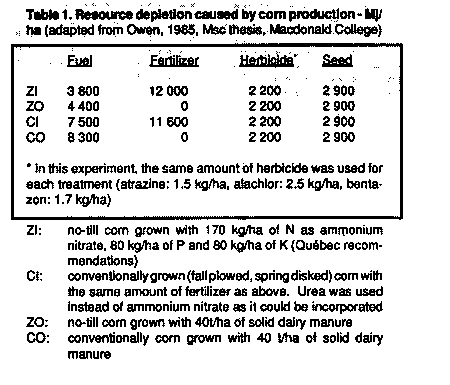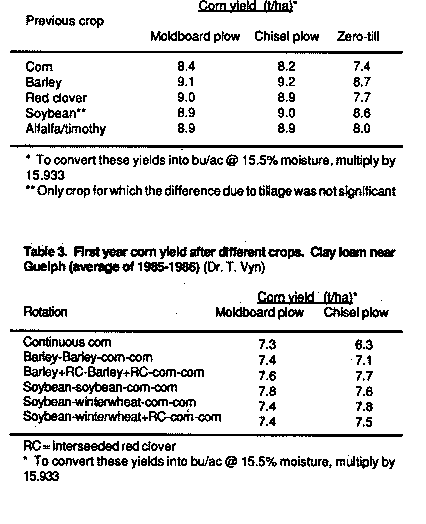
Sustainable Farming Index | Virtual Library | Magazine Rack
Search
| Ecological Solutions Roundtable
By Dr. Anne Weill
The change from conventional tillage to a zero-till farming system can lead to drastic changes in the physical conditions of soil. Decreases in plant yield have been attributed to lower soil temperatures, higher bulk densities and resistance to penetration, phytoxicity problems, and an increased weed population. On the other hand, increased soil water content have often been found to increase plant yields. Normally, one can expect to obtain good results with conservation tillage. The most important and perhaps difficult operation to accomplish under such a system is a good seeding. A heavy seeder is required with strong coulters that can cut through the mulch. Although the use of rippled coulters in front of the opening coulters may help, one has to make sure that no hair pinning (the burying of some residue with the seed) occurs. This would result in poor germination rate. A trash whipper may be used in order to clear the seeding row from residue.
A major drawback of conservation tillage is the increased consumption of pesticide and nitrogen. Weed control is more difficult because of the lack of mechanical weeding. Colder and wetter soils result in slower nitrification as well as increased denitrification. It is necessary to find ways of achieving soil conservation while reducing energy consumption. In corn production, fertilizer accounts for the largest part of consumed energy
(Table 1) and alternatives to the use of inorganic nitrogen in
conservation tillage systems should be researched. 
Poor yields were usually obtained with ZO because of inadequate placement of the seed and loss of nitrogen as the manure was left on the surface. In 1989, in the same experiment under the direction of Dr. O'Halloran, solid dairy manure was replaced by liquid manure. In all the tillage treatments, the corn which received manure was taller and greener than the corn which received inorganic fertilizers. This suggests that inorganic nitrogen can be successfully replaced by liquid manure in no till corn. If solid manure is to be used, it is necessary to incorporate it. If the soil is of light texture then one dishing may be enough, while in heavier soil it may be necessary to chisel plow the soil and then disk it.
The use of rotations is almost a rule if conservation tillage is to be successful. A study done by Dr. T. Vyn in Ontario shows that decreases in corn yield due to conservation tillage can be eliminated if rotations are used. For short-term rotations higher corn yields are obtained when the previous crop is not corn, provided the soil is plowed either with a moldboard plow or a chisel (Table 2). With the zero-till system, good results were obtained when corn followed soybeans. However, corn grown under this treatment appeared to be negatively effected, perhaps due to allelopathy, when grown following either alfalfa or red clover. These last two types of rotation may not be interesting from a sustainable point of view since they required the use of a burn back herbicide to kill the sod.

For longer term rotations, differences in corn yield due to tillage tended to disappear when the previous crop was different from com (Table 3). herbicides for corn production in conservation tillage. Banding of herbicides as described by R. Samson should be possible in the reduced tillage systems. In the zero-till system, the success of herbicide banding will depend on the relative facility of cultivating between the rows. Crops other than corn may be better suited to no-till operations on low-input farms. Winter wheat, for instance, is a crop which is not tillage responsive and does not necessarily require herbicide. Soybean can also be grown in 11 a no-till system using the no-till mow-kill technique system (R. Samson, REAP newsletter 2 and 3)
Copyright © 1989 REAP Canada
Reprinted with permission. All rights reserved.
Info Request | Services | Become EAP Member | Site Map
Give us your comments about the EAP site
Ecological Agriculture Projects, McGill University (Macdonald
Campus),
Ste-Anne-de-Bellevue, QC, H9X 3V9 Canada
Telephone:
(514)-398-7771
Fax:
(514)-398-7621
Email: info@eap.mcgill.ca
To report problems or otherwise comment on the structure of this site, send mail to the Webmaster